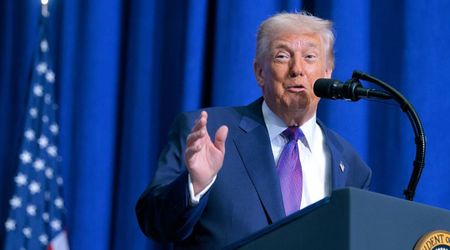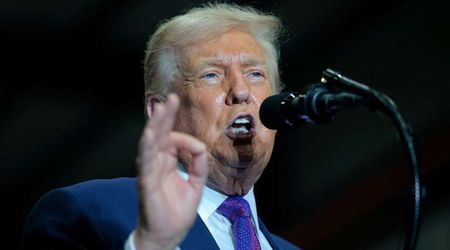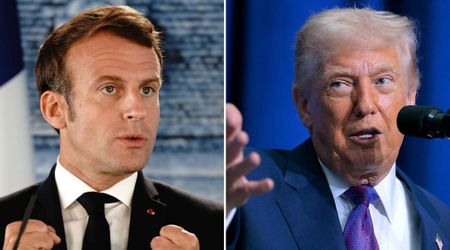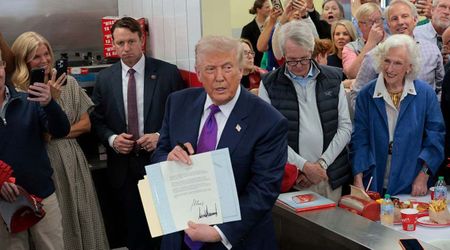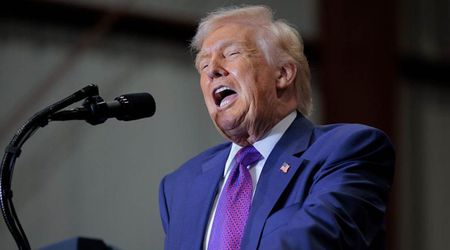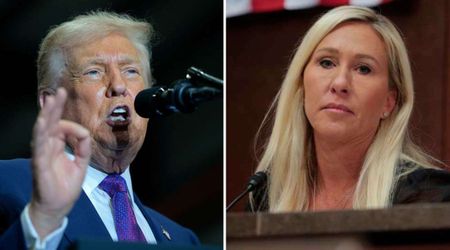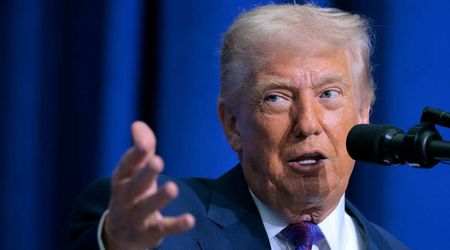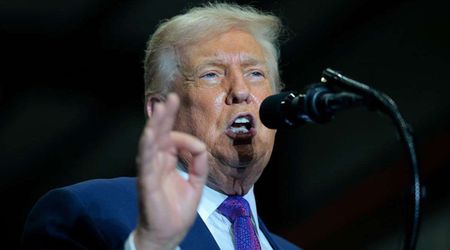Watch Kamala Harris dodge question when asked how she will fund some of her ambitious economic policies

PHILADELPHIA, PENNSYLVANIA: Vice President Kamala Harris recently laid out a series of ambitious economic proposals aimed at providing relief to American families and stimulating long-term economic growth.
However, her policy announcements have raised eyebrows, particularly regarding how these initiatives will be funded. Harris insisted that her economic strategy will eventually "pay for itself," but her explanations leave much room for debate.
Kamala Harris' economic agenda
On Friday, August 16, in North Carolina, Kamala Harris introduced a sweeping economic agenda that includes a $6,000 payment for newborns, expanded Child Tax Credits, $25,000 down payments for first-time homebuyers, and relief from medical debt, among other measures.
These proposals are designed to be implemented within her first 100 days in office, marking an aggressive start to her presidency if elected.
One of the most striking aspects of Harris’ proposals is the cost. According to the Committee for a Responsible Federal Budget, these policies could increase the budget deficit by $1.7 trillion.
The staggering figure has raised concerns about the feasibility of such an economic plan, particularly given the current state of the national debt.
When questioned about how she intends to fund these expansive programs, Harris provided a response that was both lengthy and somewhat vague.
Speaking at a press event in Moon Township, Pennsylvania, on Sunday, August 18, Harris emphasized that the costs would be offset by increased taxes on corporations and high-income earners. However, she also suggested that the real payoff would come in the form of future economic benefits resulting from a healthier, better-educated population.
"The return on investment in terms of what that will do and what it will pay for will be tremendous," Harris said. "We've seen it when we did it in the first year of our administration, we reduced child poverty by over 50 per cent, so that's a lot of the work."
She pointed to the reduction in child poverty by over 50% as evidence of the positive impact of such initiatives. Yet, Harris did not provide specific details on how these investments would lead to tangible financial returns, leaving critics questioning the practicality of her proposals.
Kamala Harris highlights long-term benefits of homeownership
Kamala Harris also highlighted the long-term benefits of increasing homeownership in the United States. She argued that promoting homeownership would lead to a greater property tax base, which, in turn, would fund public schools and generate additional economic benefits.
"When we increase homeownership in America, what that means in terms of increasing the property tax base, what that does to fund schools, again return on investment," she explained.
Harris criticized the tendency of policymakers to focus solely on immediate expenditures without considering the broader, long-term impacts of their decisions. "I think it's a mistake for any person who talks about public policy to not critically evaluate how you measure the return on investment," she remarked.
Harris' argument underscores a broader economic philosophy that values long-term gains over short-term costs. "Everybody benefits and it pays for itself," she concluded.
Despite Harris’ optimistic outlook, her proposals have not been without controversy. The press had only about three minutes to question Harris after she got off the campaign bus with her running mate, Minnesota Governor Tim Walz.
Moreover, her campaign has been criticized for not allowing more extensive press interaction, especially since she took over as the Democratic candidate after President Joe Biden's withdrawal from the race on July 21. Critics argue that Harris has not provided enough specifics on how her proposals would be funded or how they would truly impact the federal deficit.
Kamala Harris to further Joe Biden’s legacy
Kamala Harris’ economic vision also includes major housing and healthcare reforms. She has proposed building three million new housing units within her first four years in office, an increase of one million units over the goals set by the Biden administration.
Additionally, she advocates for providing incentives for companies to build starter homes and supports legislation to prevent large corporations from driving up rental prices by buying up properties.
In healthcare, Harris has called for expanding the cap on out-of-pocket costs for prescription drugs to $2,000, a measure that would apply not only to seniors but to all Americans. She also wants to accelerate Medicare's prescription drug price negotiations and increase transparency within the pharmaceutical industry.
Earlier this week, Harris unveiled a plan to implement a federal ban on price-gouging, a move that has been met with resistance from some economists.
Jason Furman, an economist who served in the Obama administration, told The Washington Post that such a policy could lead to "bigger shortages, less supply, and ultimately risk higher prices and worse outcomes for consumers" if enforced too rigidly.

